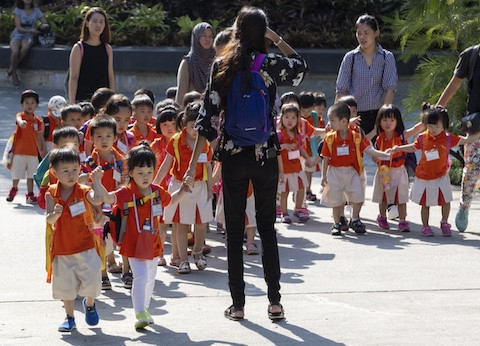
GCED Basic Search Form
Quick Search
Вы здесь
Новости

Just last month the Singapore Government made a welcome announcement. From the second half of 2023, all pre-schools will have an inclusion coordinator. This new role in schools will identify and provide support for children with developmental needs from the very early years.
This is much needed. According to the charity Serving People with Disabilities (SPD), 4,000 children in the country have been diagnosed with special developmental needs every year since 2015. Early identification of these developmental issues has the power to foster inclusion and help support a child with special needs to reach their full potential.
Yet, there are still many barriers within education systems that make it harder for children to learn. These challenges can have severe consequences later on in life from restricting opportunities to increased poverty for the most marginalised.
The inclusion coordinators in Singapore will have an important role to play in identifying children who have developmental needs. These can vary from physical conditions, such as muscular dystrophy, sensory issues such as vision, or hearing loss and various neurodevelopmental disorders and intellectual disabilities in addition to language developmental delays.
It is intended that these coordinators will ensure children are properly assessed and then will connect parents and teachers with the best early intervention support and resources. Ensuring this type of support in every pre-school classroom has the potential to maximise the prospect of inclusion of each child.
But there are risks. On the one hand, it is important that data is collected to identify children who need support and also to understand the true scope of the issue. On the other hand, these assessments can do harm by labelling children and categorising them. Putting children in boxes could lead to further stigmatisation, trigger lower teacher expectations and peer rejection. It can also lead to poor and minority students being overrepresented in special education. For example, students with immigrant backgrounds are more likely to be misdiagnosed as having special education needs, when literacy tests are not done in their home language.
Portugal adopted a non‐categorical approach in 2018. Its method moves away from the idea that we need to diagnose children medically and put them in groups accordingly in order to intervene. It focuses instead on ensuring that all children learn even if that entails following different learning paths. For children with special needs the curriculum is therefore flexible and adapted to their abilities.
An example that is not prescriptive and involves the wider community can be found in India’s Madhya Pradesh state, where an early intervention programme identifies, screens, treats and rehabilitates children under the age of five with developmental delays or physical disabilities. Its early intervention clinics bring together a range of specialists from the community, such as in public health, family welfare, women and child development who provide continuous and broad support to families who need it. They provide a range of services from the early years, such as individualised training programmes developed by a multi-disciplinary team, all the way to vocational skills training for adolescents.
The government of Singapore’s Inclusive Support Programme will be piloted in a few preschools. Assessments of children who require early intervention support will be followed up by services that will benefit them. Pre-schools will be resourced with full-time early intervention professionals who will work with early childhood teachers allowing children to receive continuous support in their own school setting. To match best practice, it is important that any approach is holistic and that inclusive education is not seen as the responsibility only of specialised teachers but of the entire school community.
One of the gaps identified in supporting children with special needs is properly trained teachers. The UNESCO 2020 Global Education Monitoring Report on inclusion and education shows that 25 per cent of teachers in 48 education systems reported a high need for professional development on teaching students with special needs in 2018. When teachers are trained, 90 per cent of children with dyslexia can be educated in mainstream classrooms. What is better is that approaches for these students can benefit all those who are learning to read.
Many children with disabilities and special education needs are defined by what they lack as opposed to what they have. They are forced to confront many barriers that societal norms throw their way. But they have the potential to thrive, if given the right type of support from the very early stages of their education that does not stigmatise them. Reducing inequality among students starts with supporting the youngest children in being ready for school early on. Inclusivity should be the foundation of the education system; if children feel that their voices are heard and their needs are met, they will thrive.
URL:
